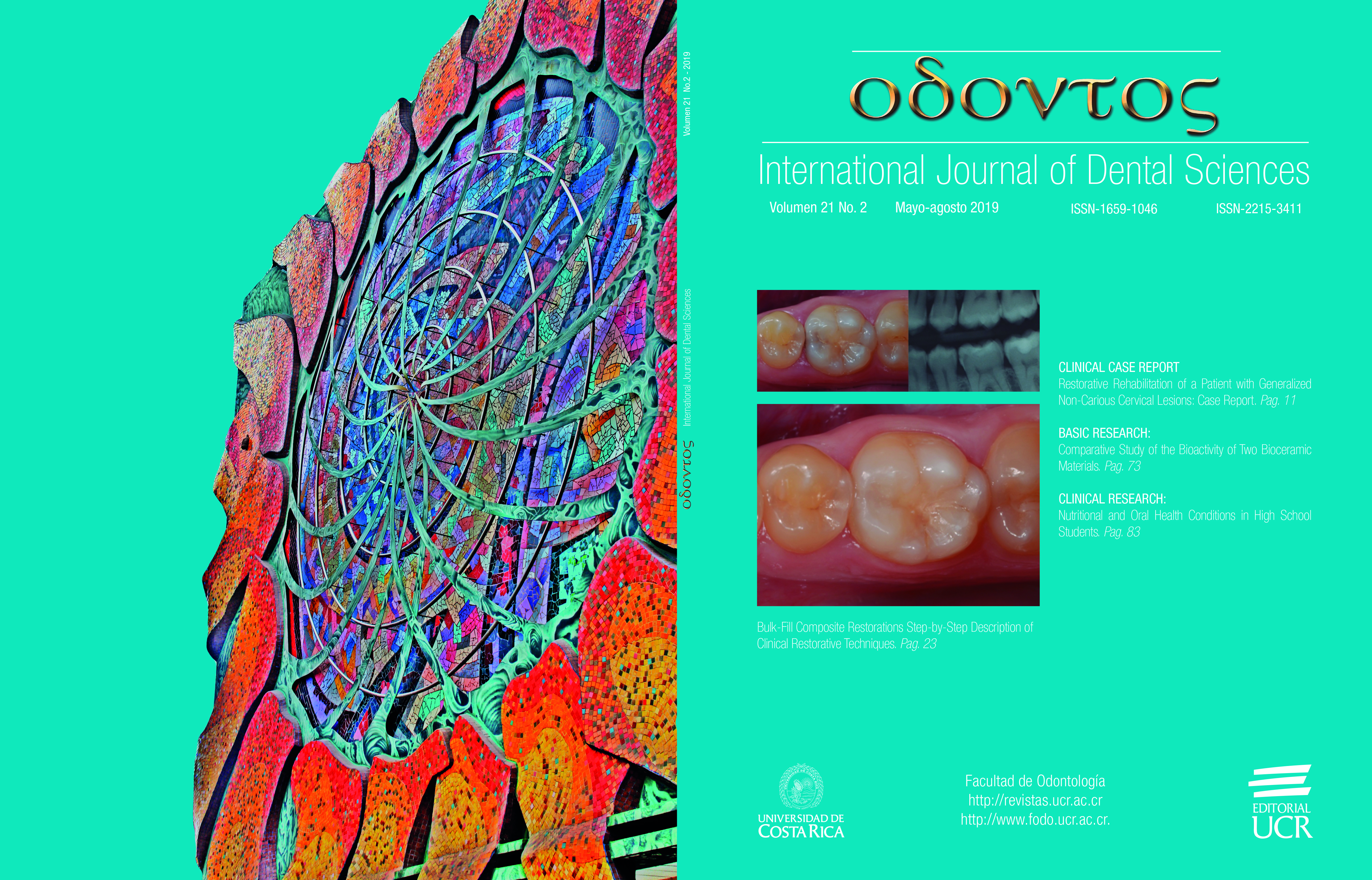Abstract
Calcium silicate-based materials have been shown to be bioactive due to their ability to produce biologically compatible carbonated apatite. The objective of this study was to analyze the bioactivity of Biodentine ™ and MTA Repair HP® in contact with human dentine discs, which were sealed and divided randomly to form four groups: group 1 Biodentine™, group 2 MTA Repair HP®, positive control group MTA Angelus® and negative control group IRM®, which were incubated in PBS solution for 10 days, for a subsequent analysis by means of MEB-EDS and Raman spectroscopy. The three calcium-based materials analyzed in this study proved to be bioactive because upon contact with a phosphate-based solution they were triggered at the onset of amorphous calcium phosphate, as the precursor during the formation of carbonated apatite.
References
Best M., Porter A. E., Thian E. S., Huang J. Bioceramics: Past, present and for the future. Journal of the European Ceramic Society. 2008; 28 (7): p. 1319-1327.
Wang Z. Bioceramic materials in endodontics. Endodontic Topics. 2015; 32 (1): p. 3-30.
Trope M., Bunes A., Debelian G. Root filling materials and techniques: bioceramics a new hope? Endodontic Topics. 2015; 32 (1): p. 86-96.
Shen Y., Peng B., Yang Y., Ma. J., Haapasalo M. What do different tests tell about the mechanical and biological properties of bioceramic materials? Endodontic Topics. 2013; 32 (1): p. 47-85.
Reyes-Carmona J. F., Felippe M. S., Felippe W. T. Biomineralization Ability and Interaction of Mineral Trioxide Aggregate and White Portland Cement With Dentin in a Phosphate-containing Fluid. Journal Of Endodontics. 2009; 35(5): p. 731-736.
Kim J. R., Nosrat A., Fouad A. F. Interfacial characteristics of Biodentine and MTA with dentine in simulated body fluid. Journal of Dentistry. 2016; 43 (2).
Ferracane J. L., Cooper P. R., Smith A. J. Can interaction of materials with the dentin-pulp complex contribute to dentin regeneration? Odontology. 2010; 98 (1).
Jnl Silva E., Carvalho N. K., Zanon M., Senna P. M., De-Deus G., Zaia A. A. Push-out bond strength of MTA HP, a new high-plasticity calcium silicate-based cement. Dental Materials. 2016; 30 (1): p. 1-5.
Rajasekharan S., Martens L. C., Cauwels RGEC, Verbeeck RMH. BiodentineTM material characteristics and clinical applications: a review of the literature. European Archives of Paediatric Dentistry. 2014; 15 (3): p. 147-158.
Septodont. Saint-Maur-des-Fossés, France. Biodentine™ scientific file. [Online]. Saint-Maur-des-Fosses; 2010.. Disponible en: http://www.oraverse.com/bio/img/Biodentine-ScientificFile.pdf
Haapasalo M., Parhar M., Huang X., Wei X., Lin J., Shen Y. Clinical use of bioceramic materials. Endodontic Topics. 2015; 32 (1): p. 97-117.
Tay R., Pashley D. H., Rueggeberg A., Loushine J., Weller R. N. Calcium Phosphate Phase Transformation Produced by the Interaction of the Portland Cement Component of White Mineral Trioxide Aggregate with a Phosphate-containing Fluid. Journal of Endodontics. 2007; 33 (11).
Gandolfi M. G., Taddei P., Tinti A., Prati C. Apatite-forming ability (bioactivity) of ProRoot MTA. International Endodontic Journal. 2010; 43 (10): p. 917-929.
Hench L. L. Bioceramics: From Concept to Clinic. Journal of the American Ceramic Society. 1991; 74 (7): p. 1487-1510.
Martin L., Monticelli F., Brackett W. W., Loushine R. J., Rockman R. A., Ferrari M., et al. Sealing properties of mineral trioxide aggregate orthograde apical plugs and root fillings in an in vitro apexification model. Journal of Endodontics. 2007; 33 (3).
Ranjkesh B., Chevallier J., Salehi H., Cuisinier F., Isidor F., Løvschall H. Apatite precipitation on a novel fast-setting calcium silicate cement containing fluoride. Acta Biomaterialia Odontologica Scandinavica. 2016; 2 (1).
Nelson D. G., Featherstone J. D. Preparation, analysis, and characterization of carbonated apatites. Calcified Tissue International. 1982; 34.
Gandolfi M. G., Taddei P., Tinti A., De Stefano Doringo E., Rossi P. L., Prati C. Kinetics of apatite formation on a calcium-silicate cement for root-end filling during ageing in physiological-like phosphate solutions. Clinical Oral Investigations. 2010; 14 (6).
Leng, Chen, Qu. TEM study of calcium phosphate precipitation on HA/TCP ceramics. Biomaterials. 2003; 24 (13).

